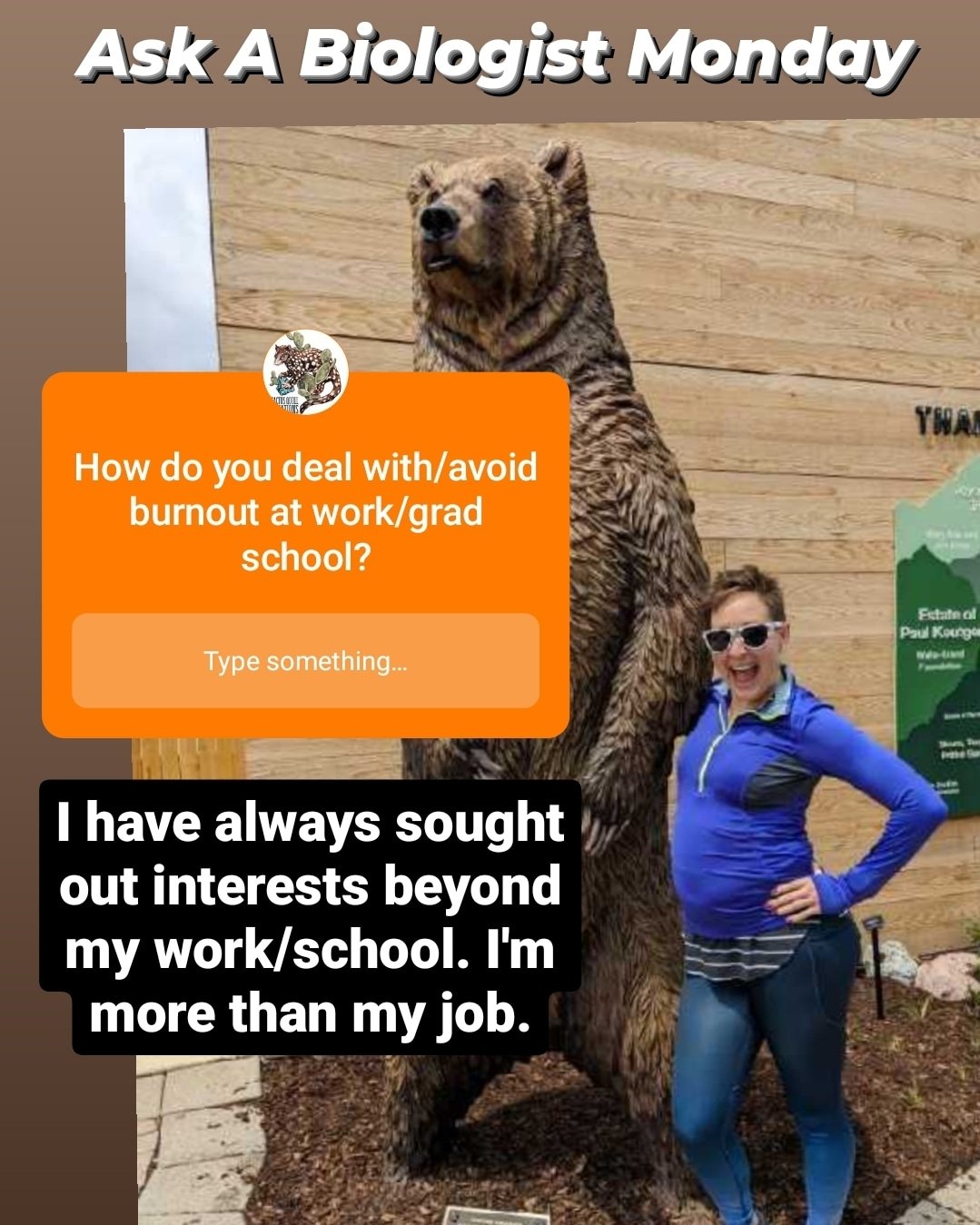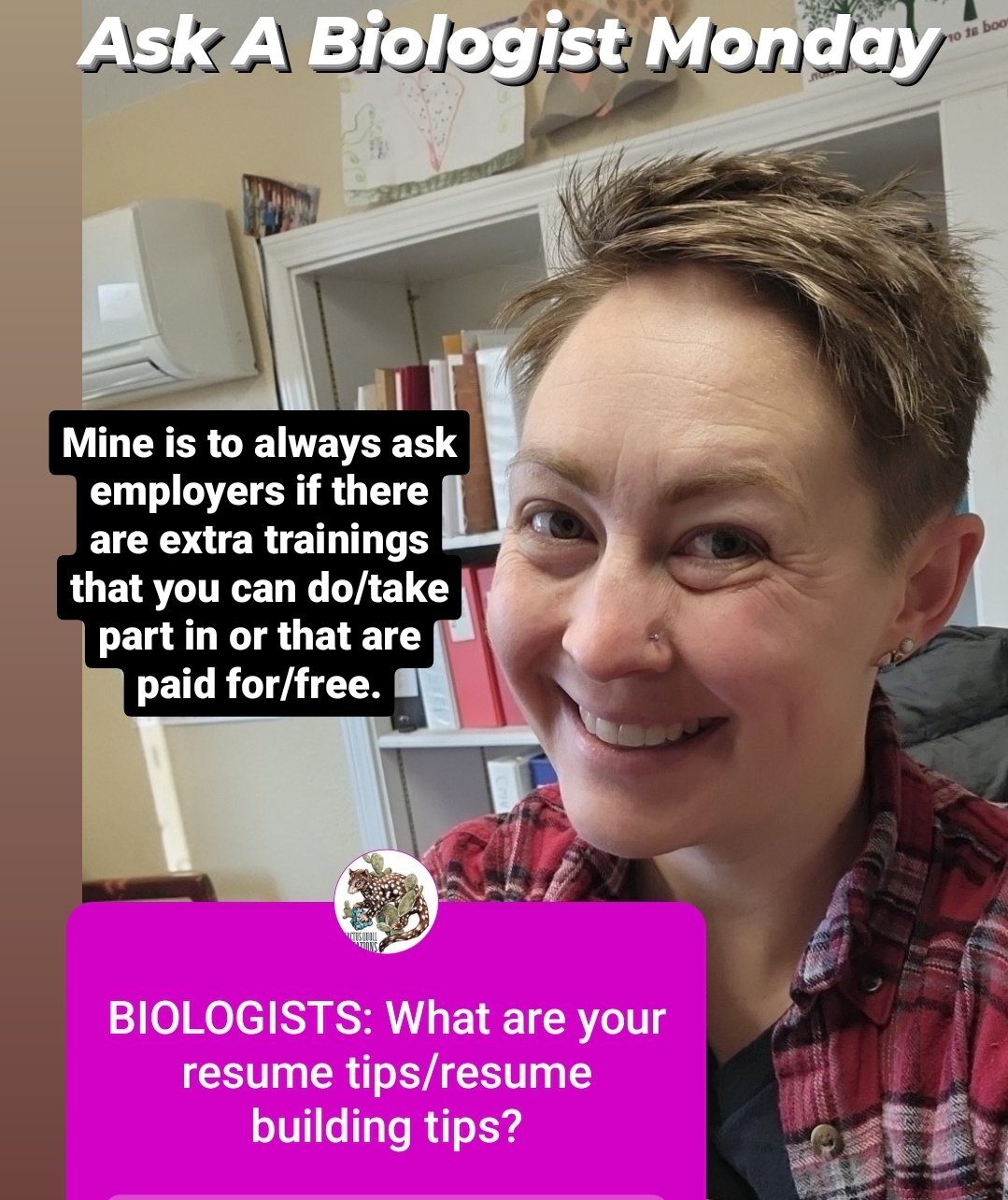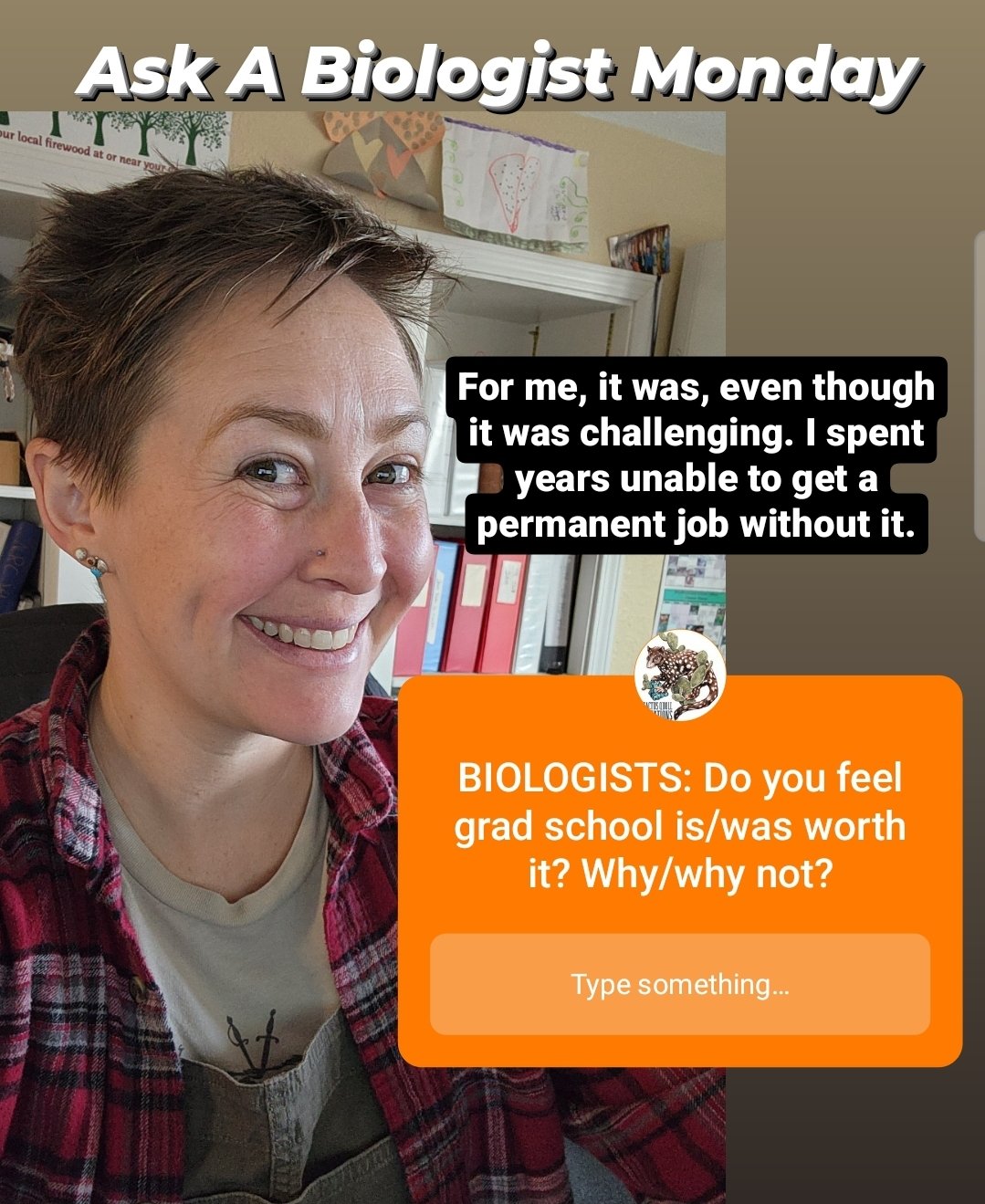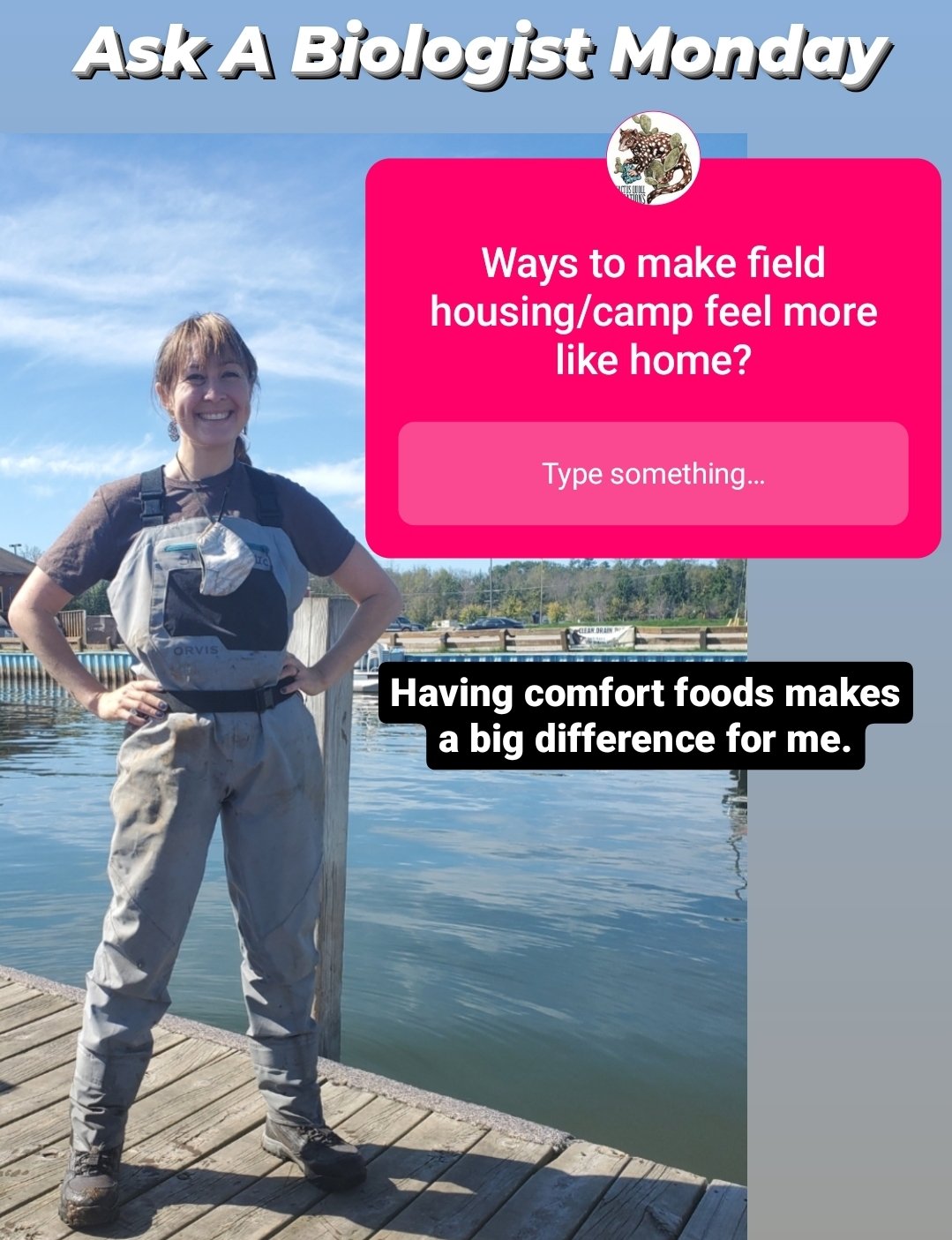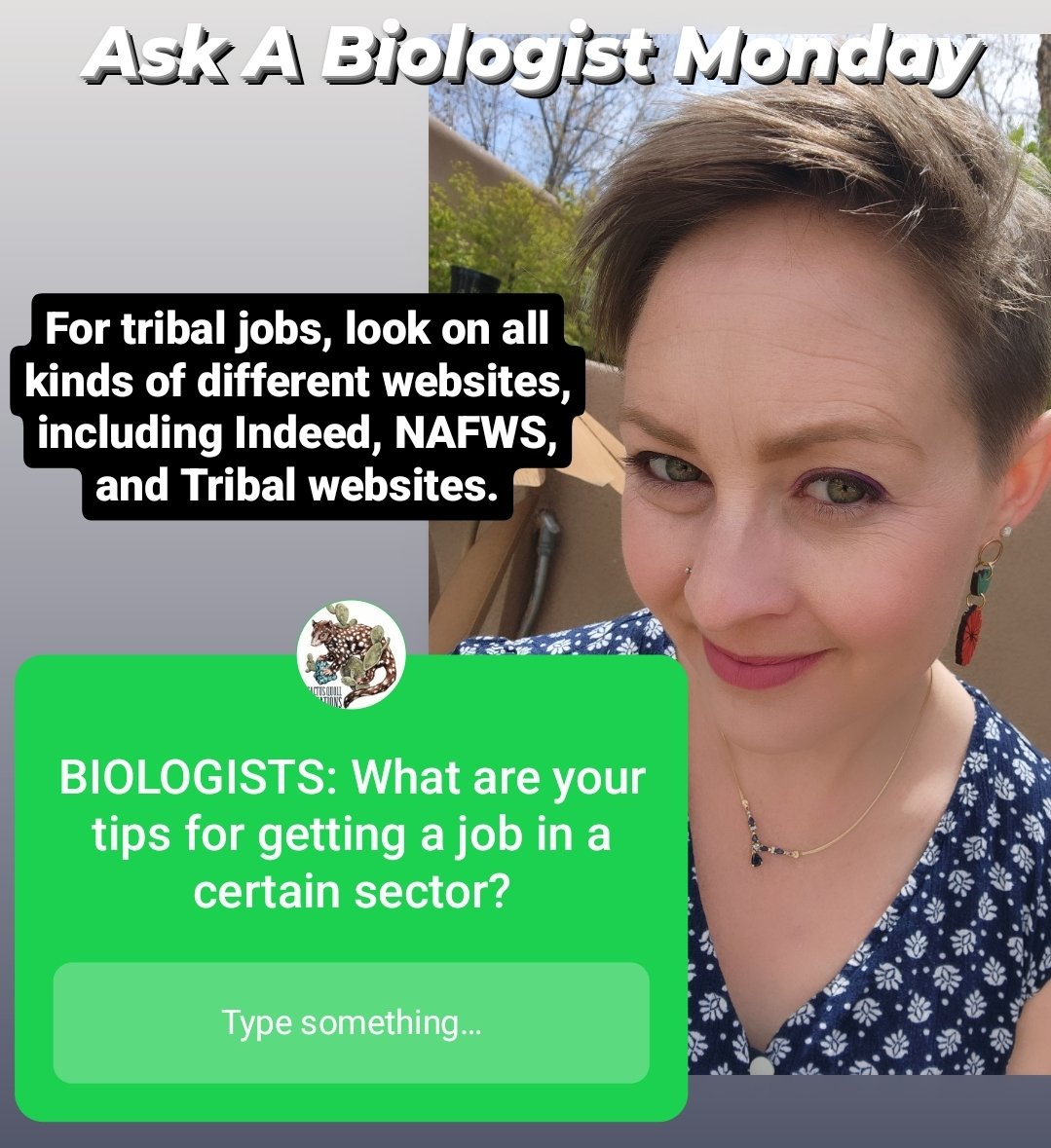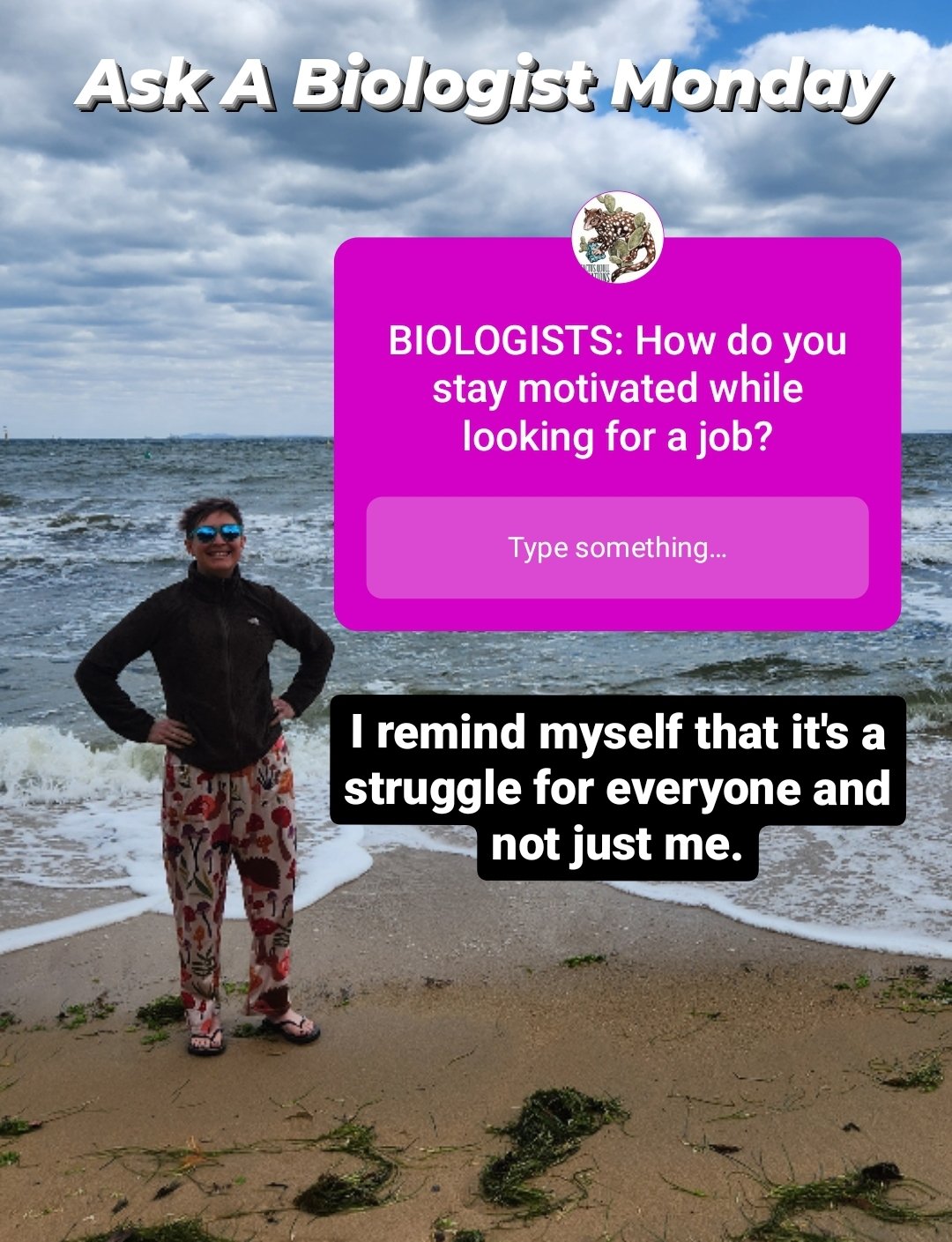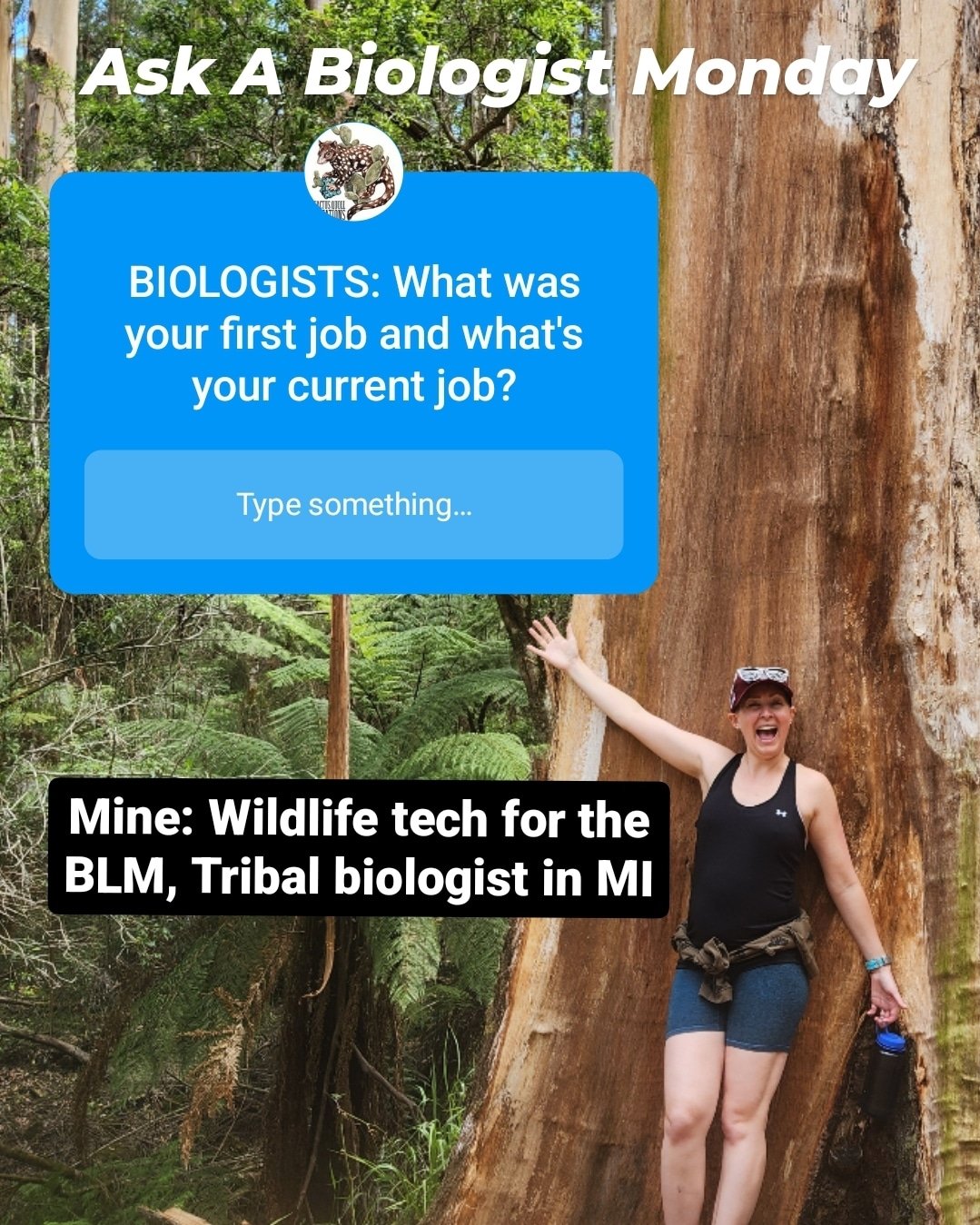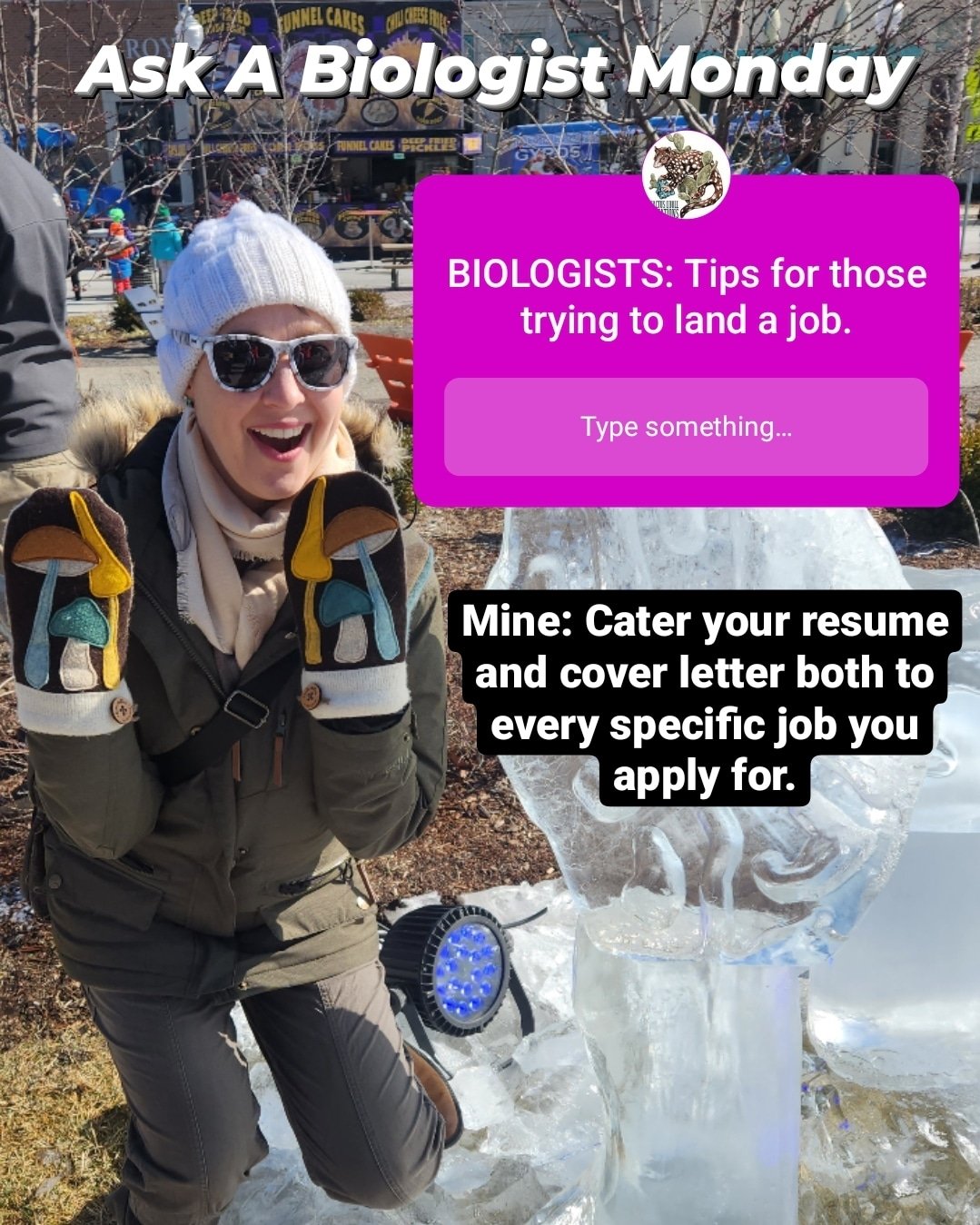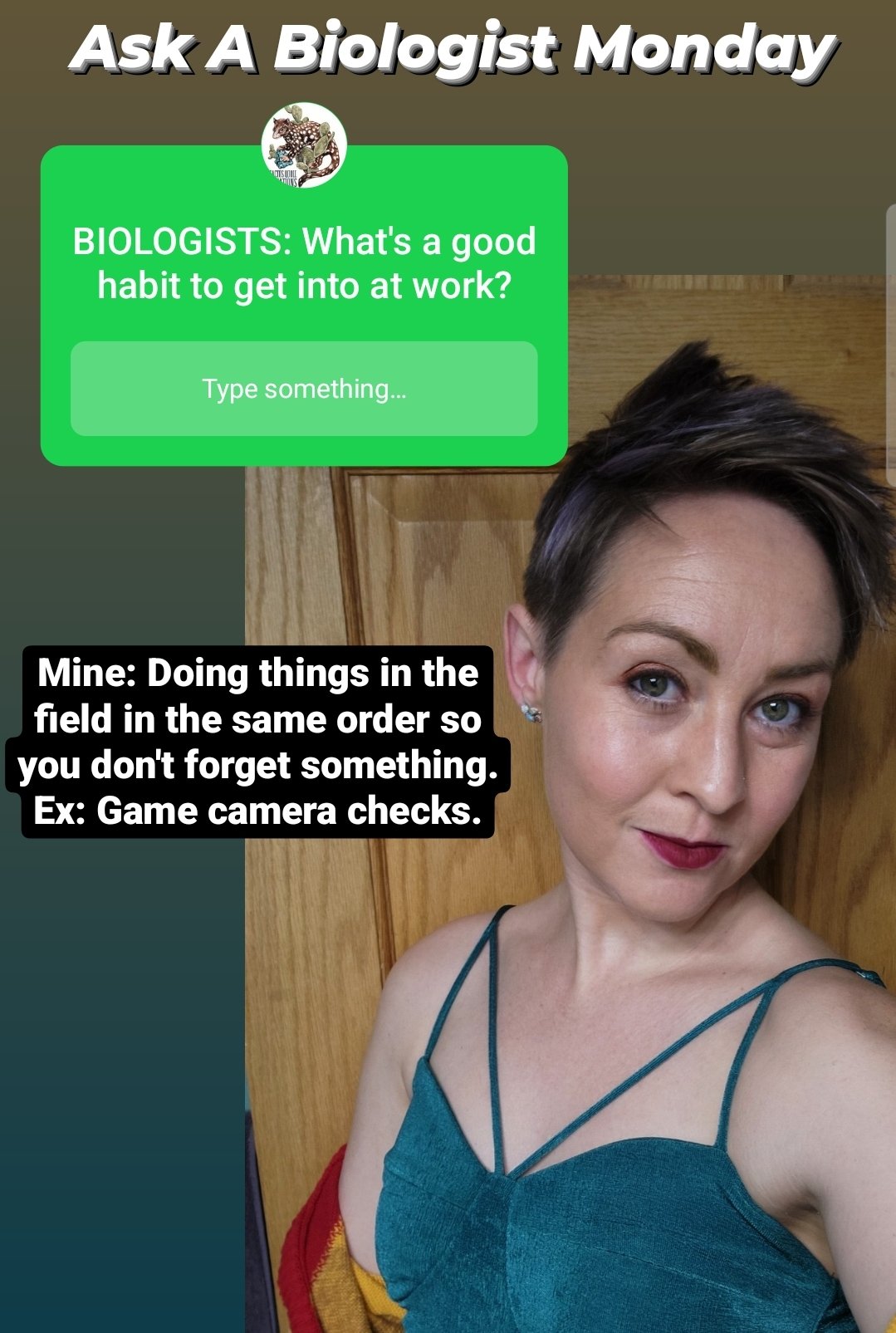Would you like to submit a question to the community of Biologists?
What is your favorite thing to do when you’re off work?
Ask A Biologist Monday 9/4/23
Answers from Biologists:
Tend to my 24 species of animals in my own little mini zoo or explore national parks.
Write, make costumes, bake, spend time with friends.
Jigsaw puzzles.
Workout, meal prep, drink a beer, trash TV.
Hike, cook, garden.
Hunt grouse with my bird dogs.
Anything film related. Watching movies, writing, etc.
Knit and play/watch DND.
Quilt.
Leave the country.
Play dumb phone games and listen to podcasts. Brush my dog. Play with the cat.
Pottery, snowboarding (winter stuff).
Hike, bike, paddleboard, horseback ride, camp.
Crochet, fencing, gardening, and pup play time.
Swim in the summer, snowboard in the winter, and video games all year long.
Forage, hike, garden, walk my dog, cook, take photos, and watch TV.
Paint.
Go birding on spots on my route home from work.
Nap.
Scroll Texas A&M.
Backpack, whittle, fly fish, cook extravagant meals.
Watch movies and gardening.
Falconry. I love nature to my core and being closer to it without it being “work”.
Botanize leisurely, swimming, snuggle kitties, gardening, kayaking, biking.
Stained glass, go to museums.
Lay in bed.
Surf on season and snowboard off. Feels so good to completely disconnect.
Hike, read, antique stores.
Spend quality time with my little.
Trail run and rock climb.
Nap. Bird field work requires early mornings so I gotta catch up on my sleep.
Read, hike, camp, hang out with my kids.
Shower off the fish scales and grime then admire my fish tanks.
Read, make puzzles, hike.
Hiking, knitting, reading, swimming, and hanging out with dogs.
Birding, kayaking, reading, pickleball.
Rock climb. Whether it’s outdoors or in the gum, it’s a great mental and physical sport.
Play video games and hang out with my kiddo.
What is something you love about being a Biologist?
Ask A Biologist Monday 8/21/23
Answers from Biologists:
I literally got paid to walk through remote, beautiful forests by myself.
I learn something new every day, whether it’s a new species, behavior, survey site, etc.
Getting other people excited about biology.
I love that the learning never ends, especially given how much we move around to different regions.
Getting to work with salmon.
Learning to see the small, extraordinary details in things that most people find ordinary.
Connecting with landowners and teaching them about habitat management.
Balancing indoor and outdoor time. I love that I get to do both.
Looking at my work with pride (usually exhausted and filthy). My job helps the health of the planet.
There’s always something interesting to be found every day.
Getting paid to look for plants and animals.
Knowing my work is directly protecting wildlife.
The variety of experiences from field to teaching to lab work to bioinformatics.
Knowing I’m doing my best to fix the issues humans have caused.
Constantly confusing people about my job (bonus: handling animals that are “creepy”)
I’m always in awe that I get to touch wildlife for work.
Getting to meet the people who spend most of their time on the land we study.
No two work days are ever the same. There’s always new experiences and places to see.
Getting to work with and learn from folks with all kinds of experience and knowledge.
Examining things I love.
Everyone sending me blurry pictures of bugs/critters and asking me to ID them.
Tips for being a good mentor/supervisor to technicians?
Ask A Biologist Monday 6/19/23
Answers from Biologists:
Don’t treat them as “techs” but as fellow professionals who also have valid and useful ideas.
Get out in the field with them. Work alongside them.
Develop personal connections (respect boundaries though). Shows you’re human too.
Focus when possible on their development as a scientist-new training, skills, etc.
Give space for techs to voice their ideas and perspectives. Be open to learn from them.
Listen to them.
Look out for their safety.
Be a good reference/network point.
Treat them as the young professionals they are (and not just a laborer to get work done).
Know mistakes will happen and address them; support wins too! Encouragement goes far.
Listen to them when they voice their concerns with an open mind.
Add professional development hours (trainings, resume workshop, interview practice).
A “good job” goes a long way for tired techs morale.
Set goals for the season for each tech.
Share your journey getting to your position.
Get them into as many trainings as possible.
Understand that they have lives outside of work.
Take a genuine interest in them as people.
Be sure they’re getting regular days off.
Fight hard to increase their pay any time that you can.
Have an up to date field safety plan.
Make sure you’re paying them a fair hourly wage.
What was/is the topic of your thesis/dissertation?
Ask A Biologist Monday 6/12/23
Answers from Biologists:
Breeding ecology and habitat selection of American Woodcock.
Dorsal patterns of Uta Lizards compared to substrate/rock they were basking and morph.
Improving detection and capture of invasive Burmese python.
Impacts of noise on songbird reproduction and behavior.
Annual grassland bird use in restored and remnant prairies.
Insect pollinator habitat connectivity in urban environments.
Evaluating and establishing baseline levels of PFAS and heavy metals in bald eagles.
How white tailed deer influence cattle fever tick abundance.
Hg transfer up food webs and spatial distribution in fish and seabirds in the Gulf of St. Lawrence.
Characterization of algal communities and their relation to water quality in a riverine system.
Taxonomy, phylogeny, and host-range distribution of parasites of sharks/fishes.
Alfalfa weevil insecticide resistance and resistance management in the western US.
Effect of mesquite encroachment on mixed grass prairie composition.
Differential gene expression in CWD-positive and negative white tailed deer.
Assessing the response of vegetation and waterfowl to the drawdown of a wetland.
Characterized the chemical profile of several species of poison frogs.
How temperature variations impact amphibian disease.
Invertebrate survey of farm. Farmer hadn’t changed their practices since the 1940’s. Lots of bugs!
Consequences of drought for juveniles and population dynamics in dryland songbirds.
Survival rates and home ranges of Blanding’s turtles.
How extreme cold climates affect aquatic microbial communities. What happens in and under the ice.
Understanding how landscape configuration impacts bobcats.
Coyote diet and population demographics.
Cliff swallows and drought.
Bioenergetics of waterbirds on Great Salt Lake wetlands under different water inflow scenarios.
Using satellite images to track dieback of Phragmites at the mouth of the Mississippi River.
Effects of paper mill effluent on the reproductive axis in bullhead minnows.
Impacts of chronic human noise on ecosystem function in the sage-steppe.
Comparative study of corticosterone levels in 3 species of water snake.
Conditional occupancy and habitat of rocky shiners, using data to get them listed with ESA.
Mountain lion resource selection and habitat use in Central coast of California.
Movement ecology post translocation from airfields of RTHA, SEOW, and GHOW.
Wild pig resource selection and efficacy of removal methods.
Effects of domestic cat presence on foraging behavior of passerines.
Space use, survival, and cause-specific mortality of white-tailed deer fawns.
If interspecific aggression between 2 salamander species affects their elevational ranges.
How different climate variables affect western larch wood density.
Pollinator biodiversity after wildfire in under-surveyed landscapes.
Cellular mechanisms that lead to preferential pH regulation in some fish species.
If flowers within a cabbage field would increase parasitism of caterpillars.
Effects of prairie dogs and their management on plant and animal communities in the Great Plains.
Barriers to wild pig management on private lands.
Mixture of toxicity of neonicotinoids (pesticides) on embryonic and larval fathead minnows.
Exploratory look into returning Snake River fall Chinook salmon “mini jacks”.
California sea lion aggression and competition.
Survey of the ensemble of medium and large mammals in protected area in Cordoba, Argentina.
Population dynamics of deer in South Florida using camera and telemetry data.
In situ hatching orientation in green sea turtles, focusing on different types of light.
Hibernation site selection/ecology of Eastern Massasaugua rattlesnakes.
Effects of invasive earthworms on the linkage between soil food web and broader food web: salamanders.
Chemical ecology of trembling aspen and impacts on plant community dynamics.
Prevalence and store/employee awareness of invasive crayfishes in retail pet trade.
Effects of industrial extractive activities (logging/mining) on zoonotic spillover risk.
Natural roost selection of the little brown bat.
Bighorn sheep respiratory disease surveillance via behavior and community science.
Measured local stream health around human activity using the Hilsenhoff index.
Toxicology of Arctic seabirds with Atlantic Puffins in Svalbard.
Effects of anthropogenic impacts on restored wetland communities.
Impacts of insecticides on migratory shorebirds in the Prairie Pothole region.
Red wolf audio cues to determine if red wolves can limit raccoon foraging behavior.
Disease and habitat suitability for nine-banded armadillos.
How social and ecological factors influence Mexican wolf home range size.
Bacterial competition and how bacteria fix and break down organic carbon.
Land use effects on turtle abundance, movement, and heavy metal bioaccumulation.
Tips for pregnancy, breastfeeding, and parenthood during fieldwork?
Ask A Biologist Monday 6/5/23
Answers from Biologists:
Be honest about your physical limitations during pregnancy.
Ask for space and time to pump.
Set firm boundaries on your work time to protect your family time.
Take as much parental leave as you can.
Don’t be afraid to ask for help. Especially lifting things while pregnant.
Freemie breast milk collection cups so you can pump on the go and be hands free.
Get a supportive hip band for hiking.
A workplace that recognizes that parents’ priorities (travel, etc.) shift is essential.
Get comfortable breastfeeding in a baby wrap or carrying. Game changer.
Hands-free pumping bras if you’re in the field without baby. Can pump while driving, etc.
Even if you aren’t ready to tell everyone, let a coworker you trust know you’re pregnant for safety.
Start baby in a carrier earlier and practice breastfeeding in it a lot.
The 40oz Stanley cup to stay hydrated. Makes it easy to drink while in the car between sites.
When pregnant, avoid handling dead stuff if you can. Zoonotics are not worth the risk.
Post partum sucks. Take all you time and do NO work during that time. Focus on healing and learning.
Remember that you are more important than your job.
Bootcut cargo pocket yoga pants, an Elvie pump, and relaxation techniques.
Take precautions against insect bites. Pregnant people are at higher risk for bad reactions.
Wear lots of sunscreen while pregnant. Your skin will sunburn easier than normal.
Don’t feel bad for taking it easy earlier in pregnancy. The whole thing is physically challenging.
Write down EVERYTHING. You’ll be shocked how absentminded you become.
Ask for flexibility with office vs fieldwork and options for work from home.
Recognize that your priorities may shift, and that’s okay!
Get a high quality cooler for storing pumped breastmilk.
Even if your boss is wonderful, tell them of your pregnancy and expected due date in an official email for records and protection.
Telling your supervisor early on about your pregnancy can offer more allowances for appointments and medical issues.
Realize that your ligaments soften and loosen in pregnancy, so be careful hiking and lifting items.
Be extra careful with your PPE while pregnant and breastfeeding.
Ask your coworkers who are already parents for their advice.
Talk to your employer/HR about how your child will be added to your insurance.
Favorite Biology themed podcast, show, movie?
Ask a Biologist Monday 5/29/23
Answers from Biologists:
Movies/Shows
Jeff Corwin Experience
Wild America with Marty Stouffer
The Lion King
PBS Nature
Fantastic Fungi
Prehistoric Planet
Inside Nature’s Giants
Princess Mononoke
Zoboomafoo with the Kratt Brothers
The Crocodile Hunter
Night On Earth
Books
Braiding Sweetgrass
Song of the Dodo
Once There Were Wolves by Charlotte McConaughty
Vaquitta by Brooke Bessessen
Big Cat Diary
A Sand County Almanac
A Mile In Her Boots
A Walk in the Woods by Bill Bryson
Podcasts
Ologies with Allie Ward
Get Out Alive
SciShow Tangents
Tooth and Claw with Wes Larson
Creature Feature
Snakes Podcasts
Poor Proles Almanac
Science Vs.
Fish of the Week from USFWS
Sawbones
Following the Tracks
In Defense of Plants
Relax With Animal Facts
The Birdy Bunch
Beyond Blathers: A Critter Pod
Radiolab
Fire University
Deer University
Completely Arbortrary
The Wild with Chris Morgan
Unexplainable
Rewildling Earth
Into the Wilderness with Byron Pace
Common Descent
Going Wild with Dr. Rae Wynn-Grant
National Parks After Dark
So You Want to Be a Marine Biologist
The Science of Birds
Huberman Lab
Snake Talk
Unnatural History Channel
Wildlife Health Connections
How do you deal with/avoid burnout at work/grad school?
Ask A Biologist Monday 5/23/23
Answers from Biologists:
Don’t check work email outside of work.
Turn off your work phone outside of work hours.
Take ALL your paid time off.
Set a clear working schedule and stick to it.
Never feel bad for taking a vacation.
Make friends outside of the field.
In grad school I set aside time just for me every week.
Find time to spend with friends and family. FaceTime if you can’t physically meet.
I don’t answer my work phone outside of working hours unless it’s an emergency.
I go camping in an area with no cell service, ideally with a river.
Try not to schedule seasonal jobs back to back.
Have a strong support system (family/friends) who will be there for you.
Make sure I’m spending free time in alignment with my goals-no mindless scrolling.
Boundaries. I work hard and if I don’t get everything done that means it can wait.
Being strict with separating work and life. No calls etc. after working hours.
Having a solid morning and night routine helps prioritize putting my needs first.
Not using my career as a biologist as my only identity.
Turn off email notifications on evenings/weekends. Helps turn my brain off my thesis.
Using my PTO or even taking unpaid days off if I’ve been working a bunch of overtimes.
Establishing clear boundaries for myself and others about when I will check/respond to work emails.
Set boundaries with your time.
Use your leave without feeling guilty about it.
Prioritizing time for my hobbies. Makes me feel human again and then I’m more productive.
Grad school part time while working full time. My mental health is way better even if it will take 4 years.
Retrained myself to see sleep as a necessity NOT a luxury.
Chinese martial arts and painting.
Boundaries. I make space for what makes me feel like myself.
Get a work cell phone. It was a game changer for me.
Hobbies.
If you have sick days, don’t feel bad about using them as mental health days.
Find time to get out of the office and do things you love. I try to get outside/go birding.
I need a sport or past time, preferably one where I’m unreachable. Currently it’s surfing.
Ask for help. Learn to delegate tasks to others.
Talk to others about your struggles. You’re not alone.
Reframe the way you look at work-it truly is just a job and you are more than your career.
Take breaks throughout your day. Step away and go for a walk or play a video game.
Exercising. It keeps me sane!
Making myself good meals/snacks. It’s such a nice break and makes me feel better.
Prioritize sleep.
What are your resume tips/resume building tips?
Ask A Biologist Monday 5/15/23
Answers from Biologists:
Get examples from others that have success in finding programs or work.
Use tables in Word to organize, align, and format more easily.
Don’t include an address. It may make them pick someone located closer than you.
Highlight words from the job announcement and address each qualification in your resume.
Keep your resume up to date by adding accomplishments as you earn/complete them.
Include a list of relevant skills.
Put dates next to trainings to show when you took them.
Don’t include a photo. It’s just asking for bias to happen.
List experience from most recent and include job duties.
USAjobs is very specific. Take a workshop or ask someone who has gotten through to help.
Always get another set of eyes on it to check for grammatical/formatting errors.
Try to get a professional in the field to check for content.
Ask around for opportunities on different projects outside of what you do.
Asking on Twitter if anyone could look at my resume gave me the best advice/connections.
Use your cover letter to explain your resume and connect the dots.
Include at least 3 reliable and relevant references on your resume with contact information.
Reach out to current/previous employers about what stood out to them when hiring you and what to improve.
Let your references know that you’re applying to positions and that they might be contacted.
Do cause and effect on past jobs. I did “A” that resulted in “B”.
Have a master document of everything you’ve done that you add to over time.
Quantify your tasks. “I banded X birds per week while training X technicians”.
Color code your drafts to know what to include for different roles.
Highlight relevant skills from all of your jobs.
Start tracking all your wildlife observation/handling hours in excel. Permits require detail.
Tailor it to the job/niche you’re applying for.
Always have someone proofread it.
You don’t have to limit it to one page.
Bullet statements and concise phrases make reading easier for hiring panel.
Include your name as the header/footer on each page.
Do you feel grad school was/is worth it? Why/why not?
Ask a Biologist Monday 5/8/23
Yes-it allowed me to change careers, break into the field, and land a permanent federal job.
Yes-Grad school gives you soft skills you don’t learn at tech jobs (planning, writing, etc.)
Yes-It teaches you how to run a full on scientific project from start to finish.
Although it was stressful and challenging, yes. I landed a permanent job because of it.
It’s possible to get a permanent position without grad school, but you’re often more limited in ability to change jobs/be promoted.
Make sure you have experience too. Higher degrees without it may not get you the job.
Not everyone can afford a higher degree. Been on hiring panels and the right experience my go further.
Yes IF it is a thesis based MS. Otherwise you’re just taking more classes and paying for it.
I got a state biologist job without grad school but all my peers have master’s.
As bad as grad school is, I think it’ll be worth the job security once I’m on the other side.
Yes-it helped me with critical thinking and improving, planning and data management tools.
Yes-it helped me to learn how to apply for and manage a grant.
It was not for me. The massive toll it took on my mental health outweighs the benefits I got.
Yes-many well paid permanent positions now require an MS.
Yes BUT get experience between undergrad and grad school or you’ll end up both under and over qualified.
Yes-It gave me the experience and confidence to lead project (with a supportive advisor).
Yes-if you take the time and effort needed to find a good advisor and project/program.
It was worth it for the learning experience alone. It’s still hard to get jobs (but easier than without).
Yes-It gives you a safer environment to fail in and a group to guide you along the way.
Yes-it shows commitment to science.
Brutal but yes-MS was required for my first non-seasonal job
Yes-Project management skills.
Yes-It opened more doors for me afterwards. I networked heavily and it paid dividends.
Yes-was taken more seriously as soon as I started my MS. Landed a job, finished online.
Yes-It put me in the running for permanent over seasonal jobs and let me get my professional cert.
Yes-It helped me realize I was smart and capable enough to be in this career field.
I was able to get a Forest Service job without grad school. It can be done.
Depends, but no for me. I was able to land my permanent with a BSc and 5 seasons of work.
Yes-Having it on the resume increases pay rate (federal).
Yes-if your employer pays for it.
Yes-It helped me to make important connections in the field.
Depends on what kinds of jobs you want to do. It definitely opens a lot of doors and is good for networking.
If you choose the non-thesis route, be sure to work simultaneously in a relevant job.
Currently in grad school. As someone who has been a tech for 10+ years, definitely worth it.
You can get a permanent job without it, but it often takes longer and your pay is lower and duties are more basic.
Yes-I’ve been able to make a lot of connections and was even able to get the DFP (Doctorate Fellowship Program) this year.
Yes-and I didn’t finish. But the skills I learned and courses I took got me where I am now (federal job).
It really depends on where you want to go with your career. But if you want to-talk to current grad students.
Yes-It allowed me to get a permanent fulfilling job. Lots of important biologist skills too.
Yes-but get some work experience before diving into a program. Helped me recognize opportunities.
Currently pursuing an MS after 5 years as a full time state bio. So far so good. Love being back in school.
Yes for career. No for mental health.
The first time no. The second time, yes. Different season in life, perspective, and experience.
Yes-I wouldn’t have my career without the degree, but also my program was fun.
Yes BUT I think working beforehand was critical to it being worth it.
Fundamentally yes because it’s on many job requirements and I want this career.
Yes-transferrable project management tools that give you bargaining power.
Depends on the end goal. In today’s times, and MS is worth it. PhD depends on dream job.
Yes and no. It took a HUGE toll on my health but I made friends and it qualified me for a higher federal job rating.
It might have. I had a BA but my eco firm only promoted MS and PhDs.
Helped me learn I have ADHD because of all the decisions I made, so that’s good.
You can sometimes get a permanent position without and MS but duties are often tech level still.
Ways to make field housing/camp feel more like home?
Ask A Biologist Monday 05/1/2023
Answers from Biologists:
Food food food and a fridge for cold beer after a hot day in the field.
Decorating your space even if you’re only going to be in the housing a few months.
Hanging up one or two pieces of art.
An extra cozy blanket and hot water bottle.
A tapestry.
I have all my friends sign my field pack so I can always have them with me in new places.
Always bring a fan (never know the A/C situation) and a lamp (for cozy lighting.
Supplies for your hobbies. Painting, crafting, whatever it may be bring it.
I always travel with a small library of my favorite books.
Playing your favorite music (as long as you’re not disturbing roommates or anyone nearby).
Organize fun dinner nights with your roommates.
String lights. Makes a room feel cozy.
Venture out into the area you’re living in your free time.
Make your own small travel box of kitchen essentials.
Organize your clothes so you don’t feel like you’re living out of a suitcase.
A rug, some framed art.
Put together a nice shower caddy with cozy bath towels.
A good pillow. Getting a good night’s sleep away from home can be hard but a good pillow helps.
Small creature comforts, like my hammock and a book.
A way to watch your favorite shows or movies (even downloading them sometimes).
My books, paints, and tea.
If you can spare the weight, actual dishware. Eating off a real plate makes a big difference in comfort.
Having a colorful blanket. I always brought a fun quilt for that homey feel.
Find a local cafe/pub and make it a point to start late or kick off early once a a week for some R&R.
Have friends/family send care packages. Makes remote supply drops more exciting.
Maintaining some sort of routine, like morning workouts.
Find a time to get away for video calls to loved ones.
Real sheets and blanket instead of a sleeping bag on a bare matress.
Board games to play with coworkers.
Hot water in a Nalgene to cuddle with in your sleeping bag.
Photos/postcards of home to decorate with.
A good mug and blanket for comfort.
A few real pictures in frames and my own pillow and bedding.
Slippers.
Ditch the sleeping bag for real blankets.
Make your bed cozy with lots of pillows and blankets.
Get to know the locals.
Don’t be afraid to adventure around on your own.
Best/most important summer fieldwork items?
Ask A Biologist Monday 4/24/23
Answers from Biologists:
Deet.
A decent hat.
Anti-itch cream for those inevitable bug bites.
Eye protection.
Technu for encounters with poison ivy/oak.
Eye protection.
Polarized wraparound sunglasses. Glare destroys you.
Kula cloth for folks who squat when they pee.
Make sure your spare tire has air and is structurally sound.
Tick repellent. Ensure your clothes are soaked in permethrin, use deet, or other approved repellents.
Chapstick.
Hats.
Infinite socks.
Neon flagging tape for keys and phones.
Big dumb hat. Good for sun, good for rain.
Wide brimmed hat.
Buff/bandana.
Sun gloves.
A good mosquito and biting insect protection system.
Sun gloves. A game changer.
A packable rain poncho. Finishing a day of fieldwork while soaked is the worst.
Quality pair of sunglasses. The eye strain is real on a bright day.
Cooling buffs and ice paces to use for palmar cooling.
Snake boots or snake gaiters. They can be hot but better safe than sorry.
M&Ms. Little sugar boost that doesn’t melt all over the place like other candy.
An extra pair of socks. Switching to clean socks at lunch time is a morale boost.
If you’re in an exposed area (esp. desert)-sun hoodie.
Snacks, snacks, and more snacks.
Dermatone for sun/wind protection.
Permethrin wash-in for clothing as bug repellent.
Snacks. And backup snacks.
Headlamp. If my day runs long, I don’t want to be headed back to the truck in the dark.
Seconding sunscreen/sun protective clothing (Bio diagnosed w/skin cancer at 28).
Mouthwash. I always get something disgusting in my mouth by accident.
Tall, non-synthetic socks to tuck your pants into (love smart wool).
A tick key.
So much insect repellent. I prefer Picaridin since it’s DEET-free.
A well stocked first aid kit-duct tape and some tweezers (especially in the desert_.
Mosquito net/hat.
Comfy boots/shoes. Nothing ruins a long day like getting blisters or skin rubbed raw halfway through.
Sunscreen.
Snacks.
Bug repellent.
Some candy or a cookie. The extra dopamine can really help on a tough field day.
Sunglasses. Especially if working on the water.
Multi tool that’s easily accessible. Never know when you’ll need it.
5 gallon water cooler to refill your water bottle throughout the day.
Bug spray and calamine lotion.
Appropriate footwear and clothing items for your environment.
Appropriate ways to carry gear.
Bug jacket for the wetlands.
Sunscreen chapstick.
A wide brimmed hat that covers the back of your neck. Sun protection is important.
Electrolyte packets to toss in water bottles. Gotta stay hydrated.
Powdered gatorade in addition to water. Restore those salts you sweat out.
Tick protection-permethrin treated clothes, spray, long socks).
Lightweight white long sleeve shirt.
Insulating water bottle.
Wet bandana on back of neck.
Freeze your extra water at the beginning of the day so it stays cold.
Comfy shoes and rubber boots for wet days.
DEET.
Hat.
Insulated water bottle.
Extra water, especially if it ends up being a longer day in the field than expected.
Liquid IV. If you’re covering a lot of ground, you need more than water.
Extra underwear and socks.
What makes a tech stand out to you for a future rehire/permanent position?
Ask a Biologist Monday 4/17/23
Answers from Biologists:
The ability to take constructive criticism.
Make the management’s job easier, not harder.
In the end, it’s a personal connection.
Doing something productive during slow times without being asked or directed. Clean, organize, prep.
Look, problem solve, think before you ask a question. Ask questions with a potential solution so I know you thought process.
Great people skills.
Follow-through.
Leadership.
People skills. They’re so important in our field.
They can admit when they’ve made a mistake and learn from it.
A willingness to learn.
Work well with others.
A positive attitude is critical.
Being a self-starter and a hardworking individual.
Takes direction well but still asks questions when uncertain.
Self-motivation. Continuing to self-learn and maintain curiosity about the field and areas of interest.
They create/enforce their own work/life boundaries.
They mesh well with our current permanent staff.
Positivity. If it’s raining and cold and they’re still like “yeah, I’m so excited to see such and such”.
Willing to be okay with not knowing, yet confident in their ability to learn.
Communication.
Willingness to try new things.
Asking lots of questions shows they are committed to doing something directly.
Knows their limitations/weaknesses and works to improve them.
Positive attitude.
Flexible with schedule changes.
Can work independently without oversight.
Work well with team members.
Positive attitude.
Good communicator.
Problem solving when you can’t get ahold of a supervisor. If you can fix the problem yourself, it says a lot.
Interpersonal skills. I can teach how to survey, but I can’t teach how to resolve conflict kindly.
Good problem solving skills. Things happen in the field that we can’t always predict.
Attention to safety protocols.
On time, ready to go.
Time management skills.
A good attitude. Some days are tough but good attitudes help.
They’re genuinely interested in and passionate about the work.
Independence/problem solving. That’s the number one key to getting rehired and moving up.
Responsive to questions.
Present at work.
Shows initiative.
Asking a lot of questions.
Ability to think critically.
Problem solving.
Wanting to understand why we do the work we do.
Wanting to be mentored.
Ability to collaborate effectively with First Nations.
Once a protocol is learned, a tech stays consistent in delivering the same quality of work.
Respects people from all backgrounds.
Tips for finding a job in a certain sector?
Ask A Biologist Monday 4/10/23
Answers from Biologists:
Find places with project leads or directors that are from your alma mater.
Go to state based conferences to meet state employees.
Don’t use the USAjobs resume template. Instead make sure you include all the required details but use your own template.
For consulting jobs, focus on specific trainings/experience like writing NEPA reports and wetland delineations.
State jobs: you need to make contacts in that state, so be open to working seasonal positions for awhile.
Reach out and network. Many people in wildlife understand the struggle and enjoy helping others.
Canada feds: Student co-ops give you an advantage. Be very specific in screening questions on job apps.
Apply to multiple postings at an agency and socialize with the interviewers. They will remember you.
Don’t get hung up on specific job titles if the description fits what you want.
Address all requirements in your resume/cover letter. Don’t make them guess at your qualifications.
State why you want to work in that specific sector.
If there is a Nonprofit or agency you would like to work for, follow them on social media for a first chance at postings.
Be courteous to everyone you work with-you never know who is connected where.
State-get a diverse background of experience.
To work in a particular state as an eco consultant, get experience with state threatened and endangered species.
Job description mining.
State job: request the full job description when applying. This has more details than the posting.
Contact current biologists in that agency directly to ask about opportunities.
Get on email job lists.
How do you prepare yourself for the field season?
Ask a Biologist Monday 4/3/23
Answers from Biologists:
I start doing stair steppers while adding weight to a pack.
Replace any expired medical equipment, batteries.
Test inreach/stat phone.
Update field safety plan.
Getting mentally pumped. Winter doldrums are done!
Go to the dentist, doctor, and fix my car before I don’t have any free time.
My field season is on and off year round so I feel like I’m constantly figuring out my gear.
Patch holes in waders.
Take my car in for maintenance and pack a vehicle emergency kit.
Make sure that my boots and socks are good to go.
Make sure my bills are set to autopay.
Forward my mail to my parents/friend.
Set my email out of office reply.
I start going to the gym and strengthen anything I’ve injured in the past.
Anticipating that I will not be fit at first and adding things to my first aid kit to cope.
I take all the trips I’ve planned, anticipating the 6 months without extra time off.
Learn new skills in the off-season so I’m better prepped than the last season.
Trail running.
Making sure my gear is in good shape for the environment I’ll be in (boots, sun shirts, first aid).
Check/refill my field pack (first aid kit, spare knife, packable rain gear, emergency food, etc.)/
Update and print out my datasheets/data collection programs.
I let my family and friends know I’ll be less available/reachable.
Meal prep with freezable meals for long work days when I get home late.
Inventory all the gear.
How do you stay motivated while looking for a job?
Ask A Biologist Monday 3/27/23
Answers from Biologists:
I think about all the stuff I’ve done in the field and how I got through it. If I can do that, I can do anything.
Calling employers to show interest. It feels like I’m doing something to help my chances.
Create a fall back plan and set a time frame to get hired by or fall on that plan.
Apply to multiple jobs and not just set my heart and hard work on a single one.
NO means Next Opportunity.
Remembering I am interviewing them for fit as well.
Sow my applications like smooth brome.
I have worked plenty of crappy non-bio jobs from hospitality to sales. Not getting a job isn’t an option.
Cross your fingers and toes. Hope you’re good enough.
Not taking rejection personally. Something I am definitely still working on.
I treat it like the Hunger Games and refuse to be defeated! The job search won’t beat me!
It’s also about timing project needs, who else has applied, and not just about me.
At this point I think it’s mostly spite. I’m too stubborn for my own good.
Rejection might be a blessing. Something better may be coming that you need to wait for.
Working in the animal field I’ve realized there will be more opportunities and better fits.
Every opportunity that doesn’t work out is leading you to something better.
I would view applying to jobs as a lottery. The more I apply to, the better my odds.
I remind myself why conservation matters.
Continually visualize where you want to end up.
Look to your support network throughout the process.
Ask for constructive criticism/feedback if you get interviewed but don’t get the job.
Focus on the things that you can control throughout the process.
What was your first job and what’s your current job?
Ask A Biologist Monday 3/20/23
Answers from Biologists:
Limited term at a state park, now a permanent conservation biologist for a state agency.
Sea turtle nesting tech in FL, now contract Fisheries Biologist for NOAA in FL.
Aviculture warden, now a seabird ecologist.
Horse wrangler/naturalist, now wildlife biologist.
Trapping turtles in the Bronx River, now wildlife damage mitigation with the federal government.
Seasonal wildlife tech with CA Department of F&W, now a master’s student at UAM in AR.
Undergraduate researcher, now NPS Park ranger.
Bat tech for VT natural resources department, now (18 yrs and a MS later), Biologist for Wyoming GFD.
Field intern at a raptor observatory, now federal fish and wildlife biologist.
Zookeeper for primates and small cats, now lead biologist for ex-situ ES breeding programs.
Cerulean Warbler tech for CMI in VA, now hawk bander for MSRW in MI.
Field tech for USGS, now Natural Resources Manager for a Tribe in Southern California.
Trail camera technician for a Serengeti project, now a wildlife guide.
Naturalist teaching folks about tide pools, now an Environmental Coordinator.
Photo tagging/data entry, now human-wildlife conflict biologist.
NPS invasive tech, now FWS wildlife biologist.
Bookstore warehouse, now wildlife technician for a consulting company.
Tech in a university lamprey lab, now a higher level of tech in a fish lab.
Seasonal retail associate, now wildlife biologist in AK.
Recreation tech, now wildlife biologist.
Sea turtle technician, now freshwater turtle biologist.
Environmental scientist, now Raptor Biologist.
Park naturalist at a NY state park, now Wildlife ecologist at a non-profit organization.
Salmon hatchery technician, now Habitat Biologist.
Technician performing telemetry tracking squirrels, now Native fish biologist.
Seabird tech at MCINWR (2011), now Arizona R3 Coordinator with NWTF (2023).
Forest Service Seasonal Botany Tech, now Forest Service District Wildlife Biologist.
Bio tech aid (Forest Service), now Wildlife Program Manager (Forest Service).
Student tech for a forestry company, now an intermediate biologist in environmental consulting.
Conservation intern (Nature Conservancy of Canada), now a wildlife biologist.
Tech at Forbes bio station, now Private lands biologist with Ducks Unlimited.
Wildlife rehab, now doing wildlife conflict prevention and management for state government.
Boat steward for the ADKs, now an Assistant Research Scientist at the NYS Department of Health.
Elk habitat technician, now Jr specialist researching desert tortoises.
Mountain lion field tech in N. California, now Tribal biologist in ID (lots of time E. of Rockies in between).
Habitat technician, now wildlife biologist.
Maintenance at a wildlife refuge, now a consultant.
Park aide for CA State Parks, now Forestry Assistant II for State Parks.
Fire radio operator, now climate change champion.
Alligator intern, now shorebird program manager.
Childcare provider, now consulting botanist.
CWD/Wildlife Health Assistant Wisconsin DNR, now Wildlife Disease biologist USDA Wildlife Services.
Summer intern at USFWS NWR, now Restoration Ecologist at wetland/stream mitigation bank.
Wildlife tech for a grad student, now natural resources specialist for NRCS.
Zookeeper, now biological science technician.
State Wildlife tech collaring black bears, now USFWS fish biologist with shortnose suckers.
Library assistant, now master’s student researching microplastics (10 year journey so far, ages 16-26).
Vegetation tech with university of MT, now soil conservationist with NRCS.
Working in agriculture (canola), then ground squirrels, then bees, now cancer research.
Wetlands technician doing vegetation samples, now lab tech in animal vaccines.
Biological aide for WI USFS, now field biologist for Quebec parcs.
Biological science aid for NPS in MT, now research scientist for NOAA in American Samoa.
Intern, now USFS wildlife biologist in ND.
Fisheries technician at a university, now Fisheries Biologist for the state.
USFWD invasive plant removal crew, now USS Wildlife Biologist.
Forestry technician for NC State, now a soil science PhD student.
Bird tech in Arizona, now postdoc on mouse olfaction in Pennsylvania.
AmeriCorps trail crew, now avian ecology MS program.
Deer tech at MSU, now furbearer/bear tech for CT department of energy and environmental protection.
Exotic Veterinary Technician, now Biomedical Researcher (Microbiologist/Geneticist).
Plant ecology tech, now plant ecologist.
Waterfowl/Migratory bird banding tech, now Graduate student in Renewable Natural Resources.
Zoology lab assistant, now environmental educator.
Fish bio aide for USFWS, now Natural Resources Specialist for the BLM.
Wildlife tech on grizzly bar project in WY, now researcher of songbirds in MT.
Laboratory Animal Medicine at Charles River, now Laboratory Manager (Physiology).
Lifeguard, first bio job: lab tech, now field botanist.
Biological Science Tech at the National Wildlife Research Center, now Master’s student.
Utility forester, now a biologist with a water district.
Neotropical migrant nest survey, now out of the field.
Noah’s Bagels crew member, now Wildlife Biologist.
Wildlife tech for the NPS on the channel islands in CA, now wildlife biologist for the Forest Service in WY.
Ice cream slinger, now wildlife biologist for the BLM.
Motorcycle rider coach assistant, now freshwater mussel ecologist.
Field officer, now a naturalist.
Slinging pizzas, now a state wildlife biologist.
Field tech VT shorebirds, now Lead biologist Guam Sali project.
Sea turtle tagging intern with USGS, now a Biologist at a WMA in Florida.
If you had to restart your career, what would you do differently?
Ask A Biologist Monday 2/27/23
Answers from Biologists:
Avoid husband/wife/partner advisor duos. Cuts down on the amount of different views and support you have from your committee.
Wouldn’t pretend I wanted to stay in academia.
Done summer internships/jobs related to the field while in undergrad.
Not used my savings to go work unpaid somewhere.
Applied to REUs during undergrad. These positions need to be talked about more.
Take a longer break (I did 6 months) between undergrad and grad school.
Taken a gap year so I could research field needs and plan for college better.
Talk to advisors/grad students more while I was an undergrad.
Gone to technical school fish and wildlife programs over traditional bachelor’s.
Take a year between undergrad and grad school to work as a tech and get more field experience.
Not make my career my personality.
Partied less in undergrad to get better results and better post grad opportunities.
Asked someone to explain the federal hiring system and student career paths.
Taken more time to find a graduate program with the resources and support I needed.
Asked for more money from my first year-round job instead of just accepting what they offered me.
Conduct undergrad research and present it as often as possible at symposiums and conferences.
Waited to find a fully funded MS position instead of paying for one.
Learned how to negotiate salary and benefits instead of just accepting the offers I got.
Believed in myself earlier, tried things earlier, and taken classes that more reflected my interests.
Not bothered with a double major and instead spent that time on internships/seasonal tech jobs.
Be more open to working with a variety of species, not just my “dream” species.
Take more time to learn and explore.
Left abusive tech positions instead of “sticking it out”.
Start working a variety of seasonal jobs while still in undergrad to find what I liked.
Make stronger connections with professors for networking/references.
Taken a year off between my MS and PhD. Going straight through is rough. Burn out is real.
Wouldn’t have done a self-funded PhD. I learned a lot but would never recommend it.
Listen to my gut and be mindful of red flags.
Advocate harder for improved field safety for myself and other techs.
Made more of a point to enjoy the ride.
Been more picky of the advisor I worked for during my MS.
Applied to more positions in different agencies than the one I am in.
Started sooner.
Joined my state TWS earlier and made connections.
Found a supportive advisor in undergrad, not just someone I admired.
More conferences/networking.
Taken more opportunities in undergrad to know my professors, wildlife clubs, etc.
Learned computer programing in undergrad and not waited until grad school.
Wouldn’t have taken unpaid internships or tech jobs.
Set up an off season job I knew I liked that could be flexible returning to each year.
Not work for the scientist I admired. He turned out to be a prick.
Do an honors that more closely aligned with my passions to build networks early.
Prioritize life-work balance earlier in my career.
Take the damn lunch breaks.
Gone back for an MS sooner. It’s hard once you’re a few years into your career.
Done more research into a PhD advisor before signing on. There are some really bad ones.
Gone to a different undergrad and done more tech work before graduation.
Done more field work in undergrad to improve my confidence.
Tips for those trying to land a job?
Ask A Biologist Monday 2/20/23
Answers from Biologists:
If you interview for a position and don’t get it, ask for feedback on what you can improve for the next time.
Reach out to the hiring manager before you apply if their contact info is listed.
Be mentally prepared for some frustration and try not to take rejection to heart.
Don’t burn bridges if you can possible avoid it. The wildlife field is small.
Personally reach out to the hiring manager.
Remember that it’s a numbers game. Keep applying.
Look up and know the different rules/tricks for federal job applications.
Use the USA jobs resume builder when applying for federal jobs.
Apply even if you don’t meet all of the qualifications.
Get a professional designation if you can (in places like Canada).
Use keywords from the job posting in your CV and cover letter. The first round is often just a scan for these.
Study the company’s website and mission statements/current projects before and interview.
Follow up the interview with a thank you email reiterating why you’d be a good fit.
Prepare 2-3 good questions for the interviewer. Remember you are interviewing them too.
If you are having no luck, cold call consulting firms asking to work.
Put relevant work experience first on your resume, followed by less relevant positions you have had.
Have other people look over your cover letter and resume.
Apply for jobs that are outside your dream job/focus area. Skills transfer job to job.
Notify your references after an interview that they may be contacted by the interviewer.
Do your research and be ready for the interview.
If you’re enthusiastic about the job, don’t be afraid to show it in the interview.
Make an effort to learn who the hiring manager is and email them directly.
Keep a list of interview questions and practice them.
For a federal job, state the GS equivalent level of previous non-federal jobs on your resume.
Keep track of interview questions you were asked in a journal so you can review them.
Even if you don’t have all of the qualifications, still apply. A strong work ethic and ability to learn are key.
Try not to get your hopes up once you’ve applied. Submit, follow up if needed, and then forget it.
Save a copy of the job posting text so you can reference it during job interview prep.
Relate non-relevant skills to this job (attention to detail, working as a team, etc.).
Be confident in applying. Don’t assume you’re not an expert.
Be persistent. It may take a lot of applying to finally land something. It’s very competitive.
List volunteer time and all trainings you have taken.
Find a shirt list of places you really want to work for and cold call them about opportunities.
Don’t ghost potential employers, even if you are no longer interested in the position.
Apply again. We remember names season to season.
Apply to jobs you don’t fit all the qualifications for.
If you interview but don’t get hired, it could be work reaching out again in the future.
Look for special hiring authorities for federal positions.
Remember you are interviewing them as much as they are interviewing you.
Leverage you network. Ask folks in biology or related fields for job and company leads.
Research the organization you are applying to. It shows you care and we always ask.
What’s a good habit to get into at work?
Ask A Biologist Monday 2/13/23
Answers from Biologists:
Make sure you’re taking days off during the field season to re-set and rest.
Bring extras of items. Pencils, memory cards, batteries, etc.
Check your field notes before you leave the field.
Set boundaries for work/life balance.
Use packing lists and double-check it when all the gear is in the truck.
Have a gear list you always check before field days to avoid forgetting something.
Always keep the truck fueled. Last thing you need is an emergency and no fuel.
Put flagging tape on everything.
Tag things with flagging tape.
Take pictures of data written on paper before you head back from the field.
Eat at consistent times.
Date everything.
Take time to fill out data sheets completely and right away so you don’t forget key information later.
Have extra boot laces on hand.
Set up data collection sheets that include automated checks to catch errors on input.
Immediately writing/recording/storing data. Don’t want to lose any precious points.
Complete the whole data sheet, even if there is missing info, write good notes.
Comment your R scripts with enough detail so someone else (or future you) can understand it.
Restock you field pack every day so you aren’t missing anything the next time you go out.
Have physical checklists even if it feels tedious.
Make a check list of all the data sheets and data that needs to be entered after collection.
Have consistent data sheets.
Get adequate sleep and fuel your body properly. You can’t run on fumes.
Keep your first aid kits up to date and check expirations.
Keep a planner. Good to look back on when you did something and set reminders.
Check and double check you have all the gear you need for the field before heading out.
Field gear checklists before you leave.
Sunscreen.
Pack your personal back the night before so you don’t forget anything.
Scan data sheets at the end of the day before anything gets lost in the shuffle.
Write things down (on paper). Back up in case phone/computer crashes.
Write down what you do each day so you can easily reference it to update you resume or for annual reviews.
Take photos of your datasheet before photos of each animal/plant/etc. so you know which is which.
Type up field notes and take photos of them each day. Saves stress and money if you lose them.
A methodological approach to tasks that limits the chance of errors.
Save ArcMap regularly.
Always bring backup gear.
Allow yourself to have bad days and not beat yourself up for it.
Turn off your work phone/computer/close email when not at work.
Take detailed notes. During meetings, fieldwork, project plannings etc.
Don’t share your personal number with the public, even conservation oriented people. Keep boundaries.
Bring an extra pair of socks and a raincoat no matter the weather forecast. Wet socks are the worst.
Remove jewelry before fieldwork.
Get First Aid/CPR certified and be prepared with medical supplies.
Embrace the dirt.
Take pictures of datasheets or scan them.
Clean your field gear and vehicle daily or weekly.
Scan everything as soon as you get back to the office (or sync if it’s digital).
Journal so you don’t forget everything that happened.
Track your hours. When I hit 40 for the week, I’m out.
Take photos of yourself and your fieldwork set up. They’re great to have for presentations later.
What is a specific skill you use at work?
Ask a Biologist Monday 2/6/23
Answers from Biologists:
Navigating even when collecting data-staying oriented is crucial.
Noticing changes in weather patterns so I don’t get stuck in a storm.
Memorization.
Plant ID.
Drawing blood from wiggly fish.
Identifying any animal in infrared imagery.
Listening for minor noise, such as leaves shuffling, to be aware of animals around me.
PIT tagging.
Using taxonomic keys in the lab/field.
Coding in R and Python for data analysis and mapping.
Public speaking.
Knot tying.
Tracking and patience.
Driving on terrible roads.
Determining age via molt patterns using UV light on owls.
Photo ID of trail camera photos.
Dissecting insects and removing various organs.
Arts and crafts. Making gear out of dollar store supplies.
Basics of taxidermy.
Estimating bird age based on feather type and wear.
Cooking good meals in the field.
Judging distance of sounds (such as owl calls).
Flying a small drone.
Species identification by sound.
DNA extraction and genotyping.
Technical/scientific writing.
Estimating the weight of animals through visual observations.
Identifying sea turtle species nests by tracks.
Forensic botany (looking at old dried up plants and figuring out species).
Animal tracking.
Not puking/feeling sick when spinning circles in a tiny twin prop plane.
Transmitter implantation surgery.
Using tire chains/driving in unplowed snow.
Radio telemetry.
Spotting lizards by their eyeshine.
Riding ATVs/ATV maintenance.
Boat/trailer maintenance.
Snow shoeing/riding snowmobiles/snowmobile maintenance.
Giving scientific presentations.














